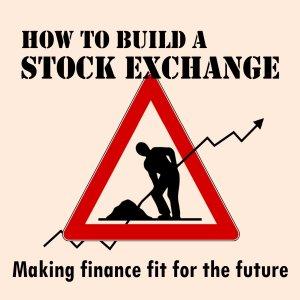How to Build a Stock Exchange

Episode 1. Finance matters
Finance matters. We’re off to build a stock exchange, but first of all I’ll spend a little time explaining why financial markets matter. This episode explores how financial markets – a crucial mechanism for the distribution of wealth – are implicated in our present political malaise and looks at some of the ways that finance has squeezed us over the last three decades.
Transcription
A famous philosopher once said – ‘It is not from the benevolence of the butcher, the brewer, or the baker, that we expect our dinner, but from their regard to their own interest.’ It was Adam Smith, of course, born not far down the road from me in Kirkcaldy, Scotland, and the father of modern economics. He once walked to neighbouring Dunfermline in his dressing gown, apparently, so deep was he in thoughts, musings like this, and ‘Nobody but a beggar chuses to depend chiefly upon the benevolence of his fellow-citizens.’
From those words, published in 1776, a whole global order has sprung. We can call it capitalism, and at its centre lies a strange entity, so much part of our lives that we simply take it for granted.
I’m talking about the stock exchange.
Hello, and welcome to this podcast.
My name is Philip Roscoe, and I teach and research at the University of St Andrews in Scotland. I am a sociologist interested in the world of finance and I want to build a stock exchange. Why? Because, when it comes to finance, what we have just isn’t good enough.
To build something – to make something better – you need to understand how it works. Sometimes that means taking it to pieces, and that’s exactly what we’ll be doing in this podcast. Over the coming episodes I will be revealing finance as you have never thought of it before. I’ll be asking what makes financial markets work? What is in a price, and why does it matter? How did finance become so important? And who invented unicorns? We will see that stock markets have places, and histories and politics. And we will come to understand just how influential stock-markets are in our everyday lives.
In this first episode I’m not going to do much building. Instead, I’m going to talk to you about why the world of finance really matters. I want to step back from the nitty-gritty of the project – we’ll see enough of that as we move along – and think about the role that financial markets play in society. You see, we can’t help noticing that things have changed in the last decade. Britain has fallen into disrepair. In the regions jobs have evaporated. In the cities casual work and portfolio careers have become the norm and it’s impossible to buy a house. Food banks are rife and one in five children lives below the poverty line. Brexit is looming, a howl of rage – as one commentator put it – against the state of the nation. I daresay swathes of North America and Europe feel much the same. But what has this to do with financial markets?
Well, the world has changed and financial markets stand at the heart of these transformations. They are not the only problem of course – but it is fair to say that finance is the mechanism on which global inequality pivots. Take risk. It’s everywhere in business, the other side of the coin from profits. The big question is who should carry it, and at the moment the answer seems to be the poor. Risk has been outsourced. It’s experienced as precarious employment, social exclusion, or plain, old-fashioned poverty, while financial markets – institutions that exist solely to manage risk – have pronounced themselves risk free. You can buy a bond rated triple A – as safe as the debt of the strongest governments – and still expect a return. Short-termism has prevented sustainable, long-term investment. At the same time, the rewards that supposedly come from taking risk – future profits – have been privatised among the financial elite, and they have done so through those same mechanisms that have shifted the risk itself: financial markets.






 Visit Podcast Website
Visit Podcast Website RSS Podcast Feed
RSS Podcast Feed Subscribe
Subscribe
 Add to MyCast
Add to MyCast